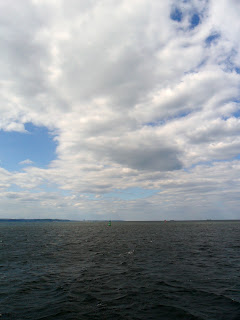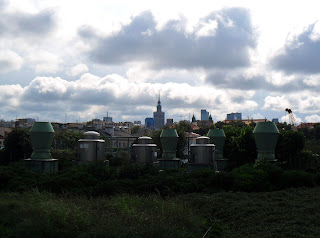This was my sixth trip to Poland in the last five years, which sounds like a lot! I definitely feel a lot more familiar now there and I am trying to make a plan to find work or study for a couple of years in Warsaw. Having family there helps a lot, and I’ve slowly been learning a little bit of Polish. Apparently, my pronunciation is good- my aunt keeps telling me I have a natural ear for the language. I’m not so sure, but I can read with relative accuracy, count to ten, and I know the names for every meal (very important). My aunt always prepares a lot of delicious food when I visit, and it’s hard to turn down, but I worry about all the pork, potatoes and sweets that are the staples of my diet here. Luckily their apartment is right by Lazienki Park, the biggest one in the city and a beautiful place to go jogging.

When my cousin Andrzej found out I would be visiting for a longer time he started planning a trip for us to the Baltic coast, which was great because I’d wanted to see Gdansk for years. We took the long train ride to the sea and spent two nights there, also visiting the seaside resort town of Sopot. Gdansk (Danzig in German) has a very interesting history, as it functioned as an independent city up until the Second World War. The architecture is striking, and reminded me of both Amsterdam and Prague. Its position on the Baltic Sea made it into an important center for trade and shipbuilding, and before the war the majority of its residents were German-speaking merchants. On September 1, 1939 Nazi Germany invaded Poland, an event which officially started the war. The first shots were fired at Westerplatte, the Polish naval base next to Gdansk. On a ferry trip to Sopot we passed by the memorial dedicated to the lives lost that day which stands on the small peninsula there. Gdansk was also where the Solidarity labor movement was born in the 1980s at the Lenin Shipyards. Solidarity leaders organized a mass strike there against the totalitarian government and formed the first independent labor union in the Soviet bloc. It was instrumental in the downfall of the communist system; one leader, Lech Walesa, became Poland’s first democratically elected president in over fifty years in 1990. Today you can visit the shipyards (which have been renamed) on a tour to learn more about their history and role in the Polish economy and political consciousness. Unfortunately, the English interpreter on our tour didn’t translate everything the guide said, so you’re better off if you speak Polish. There is another exhibition located outside the shipyards called “Roads to Freedom,” which is more of a museum to life under communism and martial law in Poland. Because the Solidarity movement was the subject of a major paper for me in college, it was very satisfying to see these places in real life.

The rest of the trip was spent lazing about by the Baltic Sea, drinking Polish beer and sampling delicacies such as pickled herring with cream and white kielbasa. We also met a German man at our bed-and-breakfast who was on a cycling trip across Poland, and had some very interesting conversations with him (imagine a Pole, a German and an American discussing the legacy of WWII or the future of social welfare in Europe and the United States). I also appreciated having more time to talk with my cousin over the course of the trip, and I’m sure that we know each other much better having spent a few days together. I feel very lucky to have my family here, and to have had so many opportunities to see them over the years. As I learn more about my grandparents’ life during and after the war I am increasingly aware of all the risks they took, and I wonder at all the ways things could have turned out differently for them (and, by extension, me). And learning more about my family here makes me proud to be a part of their life and very happy to have them in mine.

As I pack up to leave Poland (I know it won’t be the last time) I can’t believe how much has happened this year. The first day I arrived in Sofia seems like such a long time ago but it was less than a year before now. Adjusting to life on my own wasn’t always easy, but it was a very rewarding experience and I feel that I’ve grown a lot personally. I’m looking forward to going home, seeing my family and friends, and catching up on all that I’ve missed since I’ve been away. And hopefully new adventures await me next year!